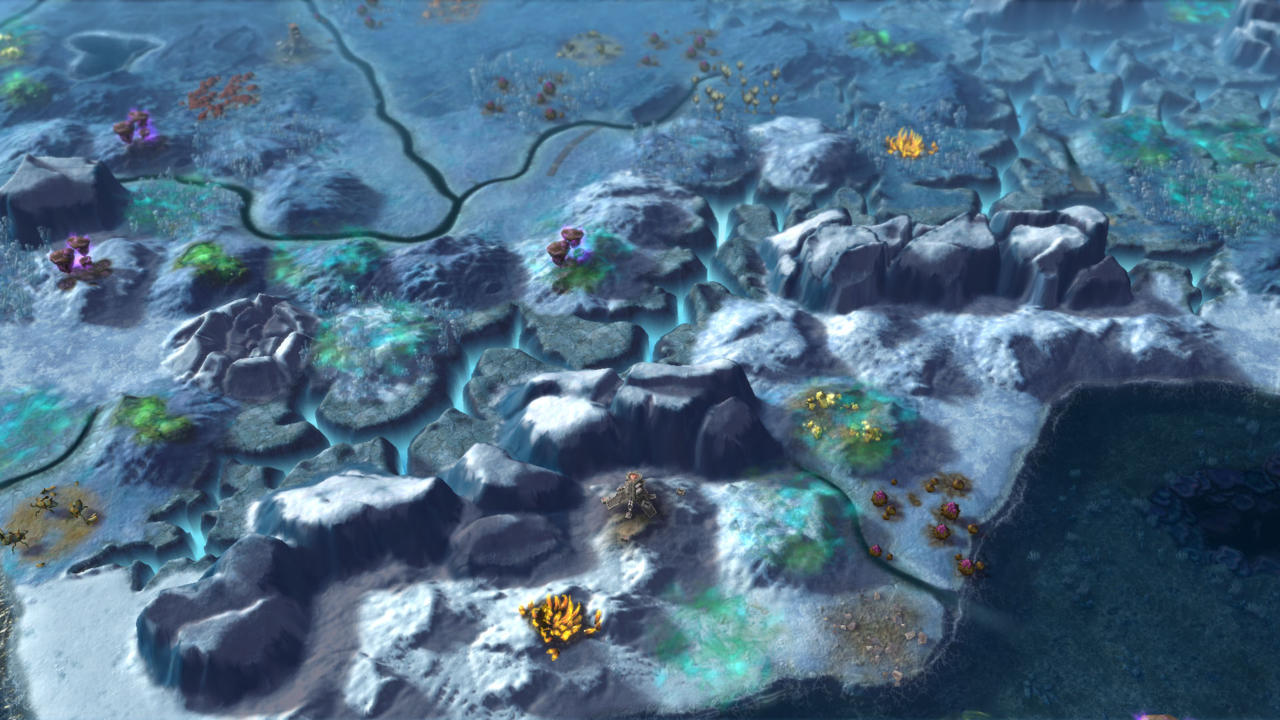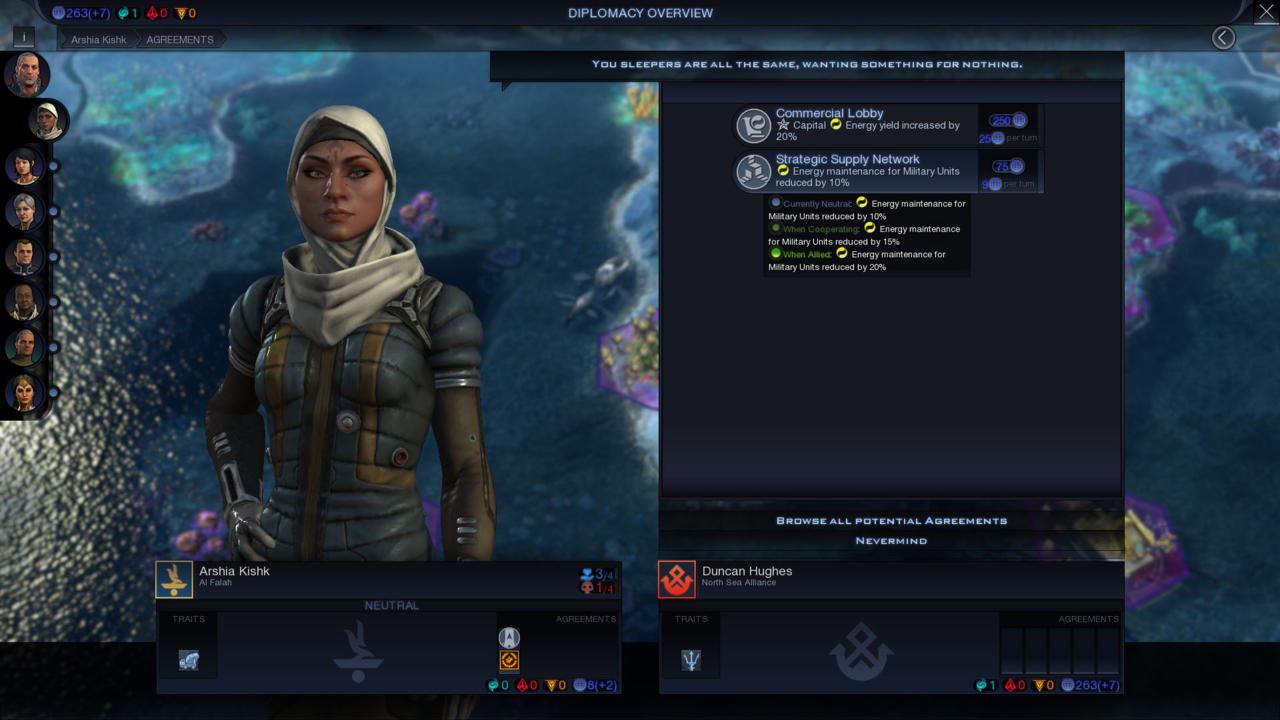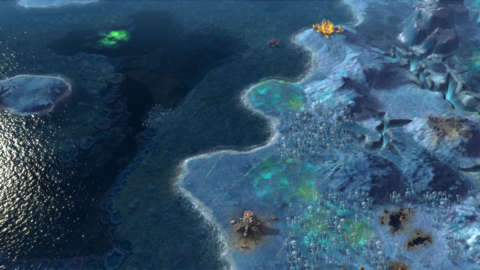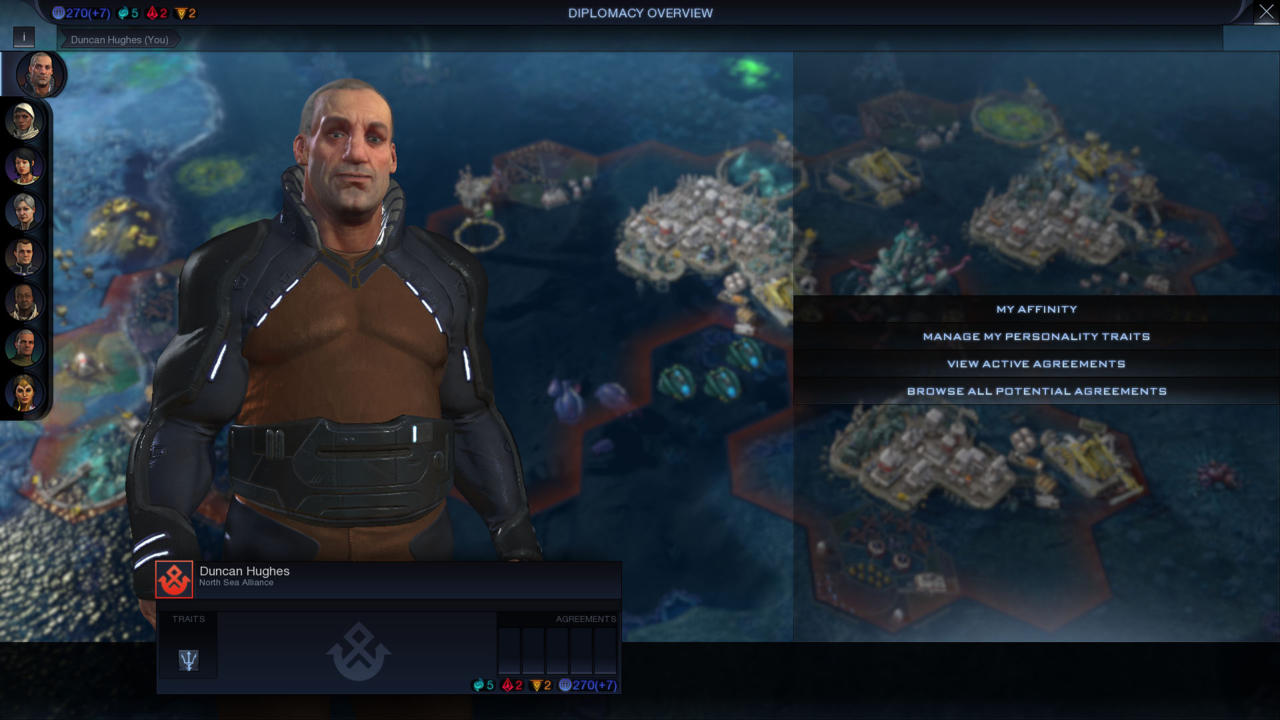Human beings are often afraid of new things. And apparently, I am afraid of moving my own floating cities.
The city in question was Deepcastle, the capital city of my burgeoning water-based empire in a recent game of Civilization: Beyond Earth - The Rising Tide. As I made my initial turns, a pop-up message told me I could move my city, and wouldn't stop popping up until I did so. Eventually, I moved the city a few tiles to the south, but it cost me production, and left me wondering if ordering my metropolis through the ocean like a giant sea-slug was worth it. In time, I might be able to move to a strategically advantageous position, but it was too early in the game for me to have a grip on benefits of the slow city-moving process.
I now curse my fears, thanks to the words of lead producer Andrew Frederiksen, who filled me in on the intricacies of water-city management. In retrospect, my unwillingness to step out of the traditional Civilization box meant I never got to experience some of the expansion's more interesting features. I relied on settlers to expand--a typical Civ approach. But I had only scraped the surface of empire expansion.
Historian Reacts To Manor Lords MultiVersus – Official The Joker Character Reveal Trailer | “Get a Load of Me” Sonic Rumble - Official Announcement Trailer BPM x ROBOBEAT Crossover Gameplay Trailer l Coming May 14th Dead by Daylight | Official Horror In Our Hearts Trailer Marvel Rivals - Hela - 'Queen of Hel' | Character Gameplay Reveal Trailer Nintendo World Championships: NES Edition — Announcement Trailer Gundam Breaker 4 - Official Release Date Gameplay Overview Trailer AEW: Fight Forever | Official Season Pass 4 Trailer Solo Leveling: Arise - Global Launch PV: Game On A Whole New Level! No Rest For The Wicked Is Brutal And Ambitious, But A Little Confused | Early Access Impressions Rocket Knight Re-Sparked! Collection | Pre-Order Trailer
Please enter your date of birth to view this video
By clicking 'enter', you agree to GameSpot's
Terms of Use and Privacy Policy
"The idea is that you're painting your terrain," says Frederiksen. "You can still buy hexes, but you don't gain from just culture growth. Now granted, you do get more culture going from a water city to virtues, so we offset the fact that culture isn't used for border growth by making it more useful for virtues. When you grow, you grow at least three tiles at a time. Because as you grow, you're pushing that whole front, which is actually significantly faster than you would ever grow a land city. But you're sacrificing production. It's fun, but it's also a tradeoff. You have to choose when you're doing it, you have to choose how far you do it, because you can only still work the tiles a certain distance away from your water city."
If you travel a lot this way, you do risk leaving improvements behind, though the natural resources remain--at least for now. "It was a question at one point as to whether or not that would happen. Don't be shocked if I am wrong and that changes at a later date!" says Frederiksen. But there are advantages to sacrificing improvements in the name of mobility that you may not have anticipated. "There are circumstances where that's a good decision, because you want to move your capital city up to the front, because it's got really good defense, and it's really strong. And I want that to guard these straits so no one comes in without my say-so, I want to hold it tight. Whereas other people may choose to just paint a small little circle that they can defend and stay within it, and that's fine too. But you can paint it along, and one of my favorite things is to hug a coastline, paint all the way up, and purchase colonists and drop them behind me, like popping little cities out."


Alas, if I had thought of these possibilities, maybe I wouldn't have been so quick to dismiss the idea of making Deepcastle a mobile home. Not that I wasn't enjoying other benefits of naval exploration. Being the bloodthirsty type that I am, I focused on virtues from the "might" category while commanding a small force of gunboats to investigate the area, annihilating alien life along the way--at least, up to a point; I didn't want to rile up the fauna too much, just enough to keep exploration lively. The sea life looks rather terrifying: piranha-like rippers are ready to tear your patrol boats to shreds, and sea dragons wield tentacle-mouths lined with razor-sharp teeth. Aliens or not, it was a pleasure to move with fewer restrictions out of the gate--though don't assume that speedier movement at sea than on land is a guarantee of success.
"You don't have hills, you don't have mountains, but that's OK, because water gameplay is not supposed to be exactly the same," says Frederiksen. "We wanted it to be something familiar, and you have the same kinds of options, but you have new tools to deal with them. So you find that one of the themes of water gameplay is that it's just faster. And not necessarily always in the number of turns, but units can move in straight lines a lot more often, and a lot of the water units have more movement so they can move further."
He continues: "You're in the open waters. It's like, 'I think I'm good, I think I'm good,' and then all of a sudden, an armada can come in, and you're, 'Oh no!' So you have to be more cognizant of how you lock things down, but hydracoral is one of the great answers, the new alien unit-slash-terrain feature, because it functions much like a mountain or a canyon in that no one can move through it unless they destroy it first."
"You can move up on land to get around it, but that's one of the advantages, too. You can use it as much for defense for you as it can be a problem for you. Sure, that blocks explorers, but you also know you aren't going to have a navy come sailing through that strait."
Historian Reacts To Manor Lords MultiVersus – Official The Joker Character Reveal Trailer | “Get a Load of Me” Sonic Rumble - Official Announcement Trailer BPM x ROBOBEAT Crossover Gameplay Trailer l Coming May 14th Dead by Daylight | Official Horror In Our Hearts Trailer Marvel Rivals - Hela - 'Queen of Hel' | Character Gameplay Reveal Trailer Nintendo World Championships: NES Edition — Announcement Trailer Gundam Breaker 4 - Official Release Date Gameplay Overview Trailer AEW: Fight Forever | Official Season Pass 4 Trailer Solo Leveling: Arise - Global Launch PV: Game On A Whole New Level! No Rest For The Wicked Is Brutal And Ambitious, But A Little Confused | Early Access Impressions Rocket Knight Re-Sparked! Collection | Pre-Order Trailer
Please enter your date of birth to view this video
By clicking 'enter', you agree to GameSpot's
Terms of Use and Privacy Policy
Ah, hydracoral. They are freaky-looking floating tentacle pods topped by sprouts of coral, and I tended to ignore them as I played, at least until I declared war on CEO Suzanne Fielding because I didn't like the way she looked at me. As we jockeyed for battle superiority, having a giant chunk of creatureflesh between me and an enemy fleet sure came in handy. What if I was somehow able to seed hydracoral for my own devious devices?
For now, I'll have to keep on wishing for such a feature, but hydracoral does play into quests related to marvels (not to be confused with wonders). Says Frederiksen, "What you can do is complete marvel quests. There's marvels, and every map will have at least one. These are these large, three-hex things, and every biome has a unique one, and there's one unique one for water, so you always get at least one. The water one is called the Hydracoral Overmind. You find one of these, and it's really big, and it starts a quest, and it starts it for all players. The quest is, 'Oh my God, you found this crazy thing. See what else you can find out about it.' In this case, you might have seen a smaller one of these. So what you want to do is go investigate these, and once you've investigated enough, you unlock the secrets of this marvel, of this plant."
"All players can do it," he continues, "so you aren't locked out, but doing it sooner is certainly an advantage. For the hydrocoral one, you find the overmind, and you go and find the nodes, and investigate them, and now that you've completed the quest, you get visibility around all hydrocoral. You'll know when units are coming, you'll know where hydrocoral is and isn't. It's a really great boost especially for a water city."
Diplomacy with the new system is an integral part of the game. It's not something you can choose to get in or not get in.
Andrew Frederiksen, Lead Producer

"The Xenosiren is a another great one. You can put it over a channel, just drop this satellite over there and the aliens will come and hang out, and all of a sudden, any army coming in there is either gonna be restricted or stopped, or have to deal with them." The Xenosiren can be used for a number of strategic purposes, actually. For instance, if you set yourself up to gain lots of experience from killing aliens, you could use it to draw your victims towards you, and then shoot them like fish in a barrel. (Rippers in a barrel, perhaps?) Or try using luring aliens in, and then use an explorer's Leash ability to add it to your own roster of units. As is usually the case with Civilization, the possibilities are great.
That includes the possibilities afforded by the tech web, which is intimidating when you're first introduced to it, but has been modified to make it easier to make sense of at a single glance. Now, every different type of unlock has a different color and shape on the web, which should make it simple to know what you're working with--even if you're color-blind. Additionally, affinity gain is no longer its own icon, but rather a circle around each icon, which improves the visual language.
Of course, you aren't alone on your Rising Tide voyage. Other civilizations are ready to impede your progress in their quests to achieve victory. Suzanne Fielding was my mortal enemy in the match I played, so my dealings with her were curt at best. Other civs, however, offered more possibilities. I played as Duncan Hughes, leader of the North Sea Alliance, a coalition of British and Scandinavian cultures that retained their seafaring expertise after the infamous Great Mistake. My first act of diplomacy was to make an agreement with Arshia Kishk, the leader of Al Falah. I would cash in some diplomatic capital; she would grant me access to a strategic supply network that decreased my military energy costs.
Diplomatic capital is an important resource in The Rising Tide. How it flows is in part based on character traits specific to that leader. (In Kishk's case, that means an increased yield from city processes.) In some sense, diplomatic capital is at the center of a microeconomy that develops around the relationships you maintain with other civs. Says Frederiksen, "Diplomacy with the new system is an integral part of the game. It's not something you can choose to get in or not get in. Even if you want to play that peaceful game, and just stay friends with everyone, and build your warp gate and get your affinity victory, you still had to have military units to defend, you still had to be prepared for what could happen."
Historian Reacts To Manor Lords MultiVersus – Official The Joker Character Reveal Trailer | “Get a Load of Me” Sonic Rumble - Official Announcement Trailer BPM x ROBOBEAT Crossover Gameplay Trailer l Coming May 14th Dead by Daylight | Official Horror In Our Hearts Trailer Marvel Rivals - Hela - 'Queen of Hel' | Character Gameplay Reveal Trailer Nintendo World Championships: NES Edition — Announcement Trailer Gundam Breaker 4 - Official Release Date Gameplay Overview Trailer AEW: Fight Forever | Official Season Pass 4 Trailer Solo Leveling: Arise - Global Launch PV: Game On A Whole New Level! No Rest For The Wicked Is Brutal And Ambitious, But A Little Confused | Early Access Impressions Rocket Knight Re-Sparked! Collection | Pre-Order Trailer
Please enter your date of birth to view this video
By clicking 'enter', you agree to GameSpot's
Terms of Use and Privacy Policy
"Diplomacy is much more akin to that, where it's involved in the game from the beginning, because even if you're not making trades with other people or declaring war, you're still working on your own personality traits and upgrading those. And you have to manage your relationships, because you have to decide if people can make agreements with you, or not. And what is that going to mean if I reject everyone? Are they going to hate me and then declare war on me, and then I'm not peaceful? It's a microcosm, but it bleeds into everything."
It's worth noting that leaders are a mouthy bunch in The Rising Tide. Pan-Asian Cooperative leader Daoming Sochua sent me a communique at one point to bemoan my miniscule population. Fielding, meanwhile, taunted me thusly: "You're not a threat with such a small army." (Shut up, Fielding.) The purpose these messages serve (think of them as getting text messages from fellow leaders) is twofold. Says Frederiksen, "These are made-up, fictional characters. And because it's Civ, we don't have the same narrative structure to introduce them and give them personality. Even where people would bring their own conceptions previously, now we have to tell you who they are."
"But not everyone wants to go read the Civilopedia and get everything about them," continues Frederiksen. "Some people just want to understand, and these communiques, and the dialogue that you see when you go into the diplomacy system, you try and make an agreement. They have unique responses to your requests, and these things are meant to drive, not just informing you of what they care about, but also a personality, a flavor. I can understand, 'This is a more serious person, this is a more jovial person.' And it just lends flavor. The hope is, you may end up like, 'I really like being friends with Rejinaldo, because his quotes are awesome, he's a crazy guy. But man oh man, does Élodie get under my skin, so I like being enemies with her, and I'm always going to play that up'."

"We take the communiques, and the diplomacy dialogue, those are all ways where we can not only share specific information, but flavor as well."
Civilization: Beyond Earth - The Rising Tide is certainly not lacking for flavor. Aliens new and old dot the landscape, as does that pesky miasma that complicates your voyages. Fully animated leaders in futuristic versions of familiar garb congratulate you and taunt you. And through it all, you struggle with the neverending urge to take just one more turn. Prepare to once again succumb to that urge when The Rising Tide is released this fall.

